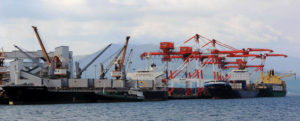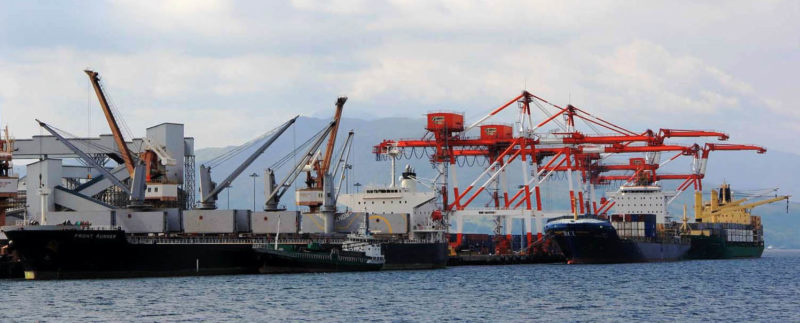
The Philippine Chamber of Commerce and Industry (PCCI) and the Export Development Council (EDC) have outlined their priority recommendations to the new Department of Transportation (DOTr) leadership.
In separate letters to Transport Secretary Arthur Tugade, PCCI and EDC suggested short-, medium-, and long-term policies and projects that will boost the country’s transport sector and benefit the import and export industries.
Maritime shipping development
For the maritime sector, both groups are asking DOTr to upgrade, expand, and promote the country’s roll-on/roll-off (RoRo) services. RoRos are promoted as a seamless transport system linking ports to one another, “but these (Roro routes) suffer from excessive distance, cost, and travel time,” EDC noted.
The export development body said RoRo routes should instead be promoted “as effective bridges connecting our islands at their closest points, for economy and speed to promote inclusive growth and countryside development.”
Aside from RoRo, EDC is also suggesting the expansion and modernization of ports, especially congested ones.
Considering the gestation period for developing an international port, EDC said the ports in Cebu, the Mindanao Container Terminal, and the hubs in Soccsksargen (South Cotabato, Cotabato, Sultan Kudarat, Sarangani and General Santos) “must be prioritized for expansion.”
The domestic ports of Cebu, Iloilo, Davao, and Zamboanga must also be modernized as regional hubs and Subic and Batangas Ports expanded as gateway ports, EDC noted.
PCCI, on the other hand, is pushing for a traffic shift to Batangas and Subic ports through market incentives “to fully maximize the capacity” of both ports.
Amendment of PPA charter
Both industry groups also sought the repeal of Letter of Instruction (LOI) No. 1005-A, which gives the Philippine Ports Authority (PPA) the mandate to collect 10% of cargo handling charges for domestic cargoes and 20% for foreign cargoes.
“… this revenue generating function of PPA is in conflict with its mandate to regulate port operators,” PCCI noted.
In connection with this, both groups are asking for the PPA charter to be amended.
“The amendment should re-define the role of the PPA as regulator and transfer its commercial interest in ports to a separate public sector entity or by creating a private corporation,” PCCI said.
For its part, EDC said amending the PPA charter and repealing LOI 1005-A is “expected to help lower shipping costs in the country.”
Another policy recommended for repeal is Presidential Decree 1221, which requires all Philippine owned or registered vessels to be repaired and dry-docked only at Maritime Industry Authority (Marina)-registered ship repair yards.
EDC said repealing the decree will liberalize the repair industry, adding that the “out-dated law goes against the government policy towards freer markets.”
Transfer of forwarders
The local chamber, meanwhile, is still pushing for the transfer of accreditation of seafreight forwarders from the Department of Trade and Industry to DOTr’s Marina “to somehow ease the burden of unwarranted fees that international shipping lines impose on importers, exporters, and freight forwarders.”
Sea freight forwarders, led by the Philippine International Seafreight Forwarders Association, have been pushing to have their accreditation processed by a DOTr agency (preferably Marina). Sea freight forwarding is the only transport sector being overseen by DTI; all others are under the DOTr.
This setup hampers efforts to institutionalize and implement the Association of Southeast Asian Nations (ASEAN) Framework Agreement on Multimodal Transport (AFAMT). The AFAMT calls on ASEAN member countries to create their respective certifying bodies for multimodal transport operators as a prerequisite for these operators to operate in ASEAN countries.
The previous government had started the process of transferring the oversight of sea freight forwarders to Marina but was overtaken by the change in leadership.
Air transport proposals
For the air sector, PCCI and EDC are both pushing for the adoption of the Ninoy Aquino International Airport (NAIA)-Clark International Airport (CRK) Dual Airport System, which directs DOTr and its concerned attached agencies to establish and implement an air traffic distribution policy for Manila and Clark.
EDC noted that developing and expanding the two gateways under the Dual Airport System will ease congestion at NAIA and road traffic around its terminals.
Additionally, both groups are asking for NAIA to be decongested and CRK to be developed. PCCI said the congestion in the country’s main gateway has “posed a serious threat to the competitiveness of the tourism and logistics sector of the country.”
To decongest NAIA, PCCI recommends allowing local airlines to invest in lighting and air navigation systems at domestic airports to make them night-rated. The investment, PCCI said, can be recovered through deductions from the landing fees of airlines.
EDC, on the other hand, suggests the transfer of general aviation from NAIA to Sangley in Cavite, the expansion of NAIA Terminal 2, and the improvement of NAIA Terminals 1 and 3, as well as the completion of a study by UK-based air traffic navigation services provider NATS on how to enhance NAIA’s capacity.
EDC’s recommendations jive with Tugade’s plans to decongest NAIA.
As for CRK, the council suggests the implementation of the Clark Airport Complex Masterplan, which has been endorsed by the Regional Development Council and the National Economic and Development Authority-Investment Coordinating Committee. It also bats for the construction of a mass transit system between Clark and Manila.
The development of secondary gateways and provincial airports should be prioritized, according to EDC. This calls for fast tracking public-private partnership (PPP) projects for the Iloilo, Davao, Bacolod, New Bohol, and Laguindingan airports. EDC also recommends declaring New Bohol, New Bicol (Daraga), and Laguindingan as international points of entry for foreign air carriers. By doing so, congestion in the capital, especially in the immediate and medium term, will be reduced, which in turn will mean lower travel cost for passengers.
Other airports that need fast-tracking of rehabilitation and development include Kalibo, Naga, Busuanga, and Dumaguete.
Similar to the request to amend PPA’s chapter, both groups are also asking for the review and amendment of Republic Act No. 9497, which created the Civil Aviation Authority of the Philippines (CAAP), toward separating CAAP’s regulatory and income-generating functions.
Tugade had earlier expressed his plan to review CAAP’s mandate, noting that “I do not believe in having a regulatory body (that) at the same time (is also) operating (airports).”
Road transport improvements
For Tugade’s first 100 days, PCCI is requesting the DOTr to review the planned phase-out of trucks that are more than 15 years old. The group said truckers have been asking the Land Transportation Franchising and Regulatory Board to consider roadworthiness, not age, for its phase-out policy “as trucks in the Philippines are usually bought 2nd hand” and are thus older.
“Brand new trucks are very costly and the rule will cause truckers to raise trucking rates,” PCCI said.
The Confederation of Truckers Association of the Philippines had earlier said that if the government pushes through with the phase-out, it must help truckers re-fleet through financial aid or incentives.
PCCI also requests the lowering of trucking rates, noting that the Manila port congestion is over, fuel prices remain low yet trucking rates remain high.
The trade association pointed out that the high cost of trucking services affects the competitiveness of the export and import industries.
Another issue that “greatly affects” the transportation sector is the collection from trucks of pass-through fees by local government units (LGUs), an additional burden on the business community, PCCI said.
“DILG (Department of Local and Interior Government) has already issued Memorandum Circular 2006-70 to address this, citing the absence of taxing power by the LGU Code on passing through vehicles but has never been implemented,” it noted.
EDC, on the other hand, said regulations should be harmonized, including those on truck bans, overloading, fleet modernization, and processing of permits.
Lastly, EDC proposes the creation of a comprehensive “national transport policy” that will promote safe, secure, environmentally sustainable inter-modal transport systems; protect and enhance the country’s physical assets; observe the hierarchy of transport systems in developing infrastructure facilities in urban and rural areas; and encourage the clustering (industrial, tourism/agribusiness zones) of industries to bring focus to and generate scale in transport-logistics infrastructure development.
PCCI and EDC had discussed these recommendations with Tugade and his team during a recent courtesy call. – Roumina Pablo





